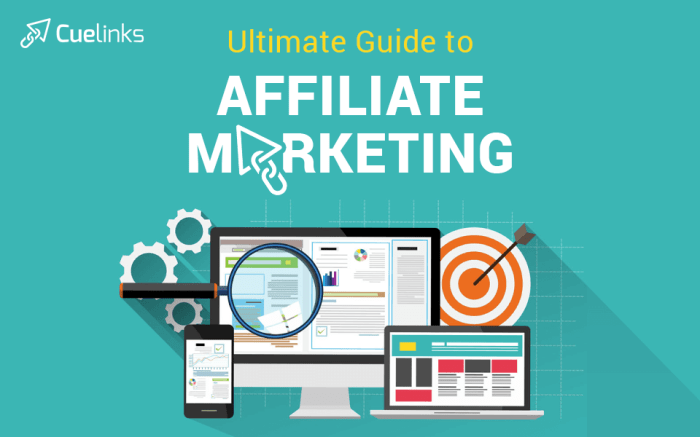Affiliate Marketing Guide brings you into the world of digital marketing with a bang! Get ready for a journey filled with tips, strategies, and insider secrets to conquer the affiliate marketing realm like a boss.
From understanding the basics to mastering advanced techniques, this guide is your ultimate companion in navigating the dynamic landscape of affiliate marketing.
Introduction to Affiliate Marketing
Affiliate marketing is a performance-based marketing strategy where businesses reward affiliates for driving traffic or sales to their website through the affiliate’s marketing efforts. It plays a significant role in the digital marketing landscape by allowing companies to reach a broader audience and increase sales through partnerships with affiliates.
How Affiliate Marketing Works
Affiliate marketing works by having merchants (companies) partner with affiliates (individuals or other businesses) who promote the merchant’s products or services on their platforms. When a customer makes a purchase through the affiliate’s unique link, the affiliate earns a commission, incentivizing them to drive more sales.
- Affiliate: The individual or business promoting the merchant’s products/services.
- Merchant: The company selling the products/services through the affiliate program.
- Consumer: The person who makes a purchase through the affiliate link.
Example: Amazon Associates is one of the largest affiliate marketing programs, where affiliates earn commissions for promoting Amazon products on their websites or blogs.
Successful Affiliate Marketing Campaigns
- Pat Flynn’s Smart Passive Income: Pat Flynn’s podcast and blog have successfully promoted affiliate products related to online business and entrepreneurship.
- The Wirecutter: An affiliate site that provides in-depth product reviews and recommendations, earning commissions through affiliate links to recommended products.
- Michelle Schroeder-Gardner’s Making Sense of Cents: A personal finance blog that generates significant income through affiliate marketing strategies.
Getting Started with Affiliate Marketing
Affiliate marketing is a great way to generate passive income by promoting products or services and earning a commission for every sale made through your referral link. If you’re looking to get started with affiliate marketing, here are some essential steps to follow:
Identify the essential steps to start an affiliate marketing program, Affiliate Marketing Guide
- Choose a niche: Select a niche that aligns with your interests and expertise to make promoting products easier.
- Join affiliate programs: Sign up for affiliate programs that offer products or services related to your chosen niche.
- Create quality content: Produce valuable content on your blog, website, or social media platforms to attract an audience.
- Share affiliate links: Insert affiliate links strategically within your content to drive traffic and generate sales.
- Track performance: Monitor your affiliate marketing efforts and analyze performance metrics to optimize your strategy.
Discuss the criteria for selecting the right affiliate partners
- Relevance: Ensure that the products or services offered by the affiliate partners align with your niche and target audience.
- Commission structure: Look for affiliate programs that offer competitive commission rates and provide reliable tracking and payment systems.
- Reputation: Partner with reputable brands and companies that have a positive track record in the industry.
- Support: Choose affiliate partners that provide resources, tools, and support to help you succeed in your marketing efforts.
Explain the importance of tracking and analyzing affiliate marketing performance metrics
- Conversion rate: Monitor the percentage of clicks on your affiliate links that result in sales to assess the effectiveness of your marketing campaigns.
- Click-through rate: Measure the number of clicks on your affiliate links compared to the total number of impressions to evaluate the performance of your promotional efforts.
- Revenue generated: Track the total revenue earned through affiliate marketing to determine the profitability of your campaigns.
- Customer acquisition cost: Calculate the cost of acquiring a customer through affiliate marketing to optimize your budget and ROI.
Strategies for Effective Affiliate Marketing: Affiliate Marketing Guide

A successful affiliate marketing strategy involves utilizing various methods to drive traffic and conversions. Here are some key strategies to consider:
Content Marketing
Content marketing is a powerful tool for affiliate marketers to engage with their audience and promote products. By creating valuable and relevant content, you can attract potential customers and drive conversions.
- Develop high-quality blog posts, videos, and social media content that educates and entertains your audience.
- Focus on providing solutions to your audience’s problems and showcasing how the affiliate products can help.
- Incorporate affiliate links naturally within your content to encourage clicks and conversions.
Email Marketing
Email marketing is another effective strategy for affiliate marketers to nurture leads and promote products to a targeted audience. Here are some tips for successful email marketing:
- Build a strong email list of subscribers interested in your niche and affiliate products.
- Segment your email list based on interests and behaviors to send personalized and relevant content.
- Create compelling email campaigns that highlight the benefits of the affiliate products and include strong calls-to-action.
Influencer Partnerships
Collaborating with influencers in your niche can help expand your reach and drive affiliate sales. Here’s how to leverage influencer partnerships effectively:
- Identify influencers whose values align with your brand and target audience.
- Reach out to influencers with a partnership proposal that Artikels the benefits of promoting your affiliate products.
- Provide influencers with unique discount codes or affiliate links to track their performance and compensate them accordingly.
Optimization
plays a crucial role in optimizing your affiliate marketing efforts and improving your visibility in search engine results. Here are some tips for affiliate marketers:
- Research relevant s and incorporate them strategically into your content to improve organic search rankings.
- Optimize your website for mobile devices to enhance user experience and increase traffic from mobile users.
- Focus on creating high-quality content that is valuable to your audience and encourages organic backlinks.
Compliance and Legal Aspects in Affiliate Marketing

Affiliate marketing is not just about promoting products and earning commissions. It also involves legal requirements and regulations that affiliate marketers must adhere to in order to operate ethically and responsibly.
Disclosing Affiliate Relationships
One of the most crucial aspects of compliance in affiliate marketing is disclosing affiliate relationships to your audience. This means being transparent about the fact that you may earn a commission if they make a purchase through your affiliate link. Failure to disclose these relationships can not only damage your credibility but also put you at risk of legal action.
- Always clearly disclose your affiliate relationships in a prominent and easily understandable manner on your website or social media channels.
- Use phrases like “This post contains affiliate links” or “I may earn a commission if you purchase through my link” to inform your audience.
- Ensure that your affiliate disclosure is visible before any affiliate links on your content.
Complying with FTC Guidelines
The Federal Trade Commission (FTC) has specific guidelines that affiliate marketers must follow to ensure transparency and fairness in their marketing practices.
- Clearly label affiliate links with terms like “affiliate link” or “ad” to distinguish them from regular links.
- Do not make false claims or endorsements about a product or service to drive sales.
- Regularly review and update your affiliate disclosure to stay compliant with the latest FTC regulations.
Remember, honesty is the best policy in affiliate marketing. Always prioritize transparency and compliance to build trust with your audience.
